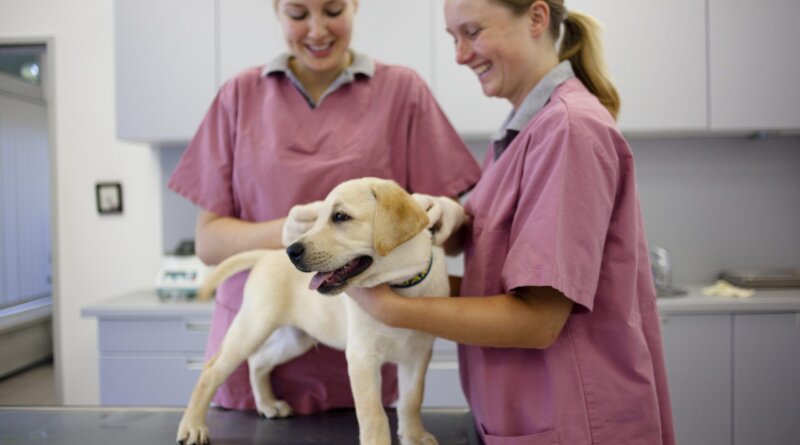What is the Best Puppy Shot Schedule?
Your puppy’s vaccinations can run from $100 to $200 or more, depending on where you live, your veterinarian’s policies, and which vaccines your puppy needs. A puppy’s shot schedule is usually based on advice from the American Animal Hospital Association, which breaks vaccines for dogs into two categories: core and non-core. Core vaccines should be given to every puppy. These include distemper, parvovirus, adenovirus (also known as hepatitis), and rabies.
Non-core vaccines are sometimes called lifestyle vaccines and may be recommended depending on where you live and what activities your puppy will be doing throughout her life. These include Bordetella (kennel cough), Lyme disease, leptospirosis, parainfluenza, and canine flu.
Most vaccines need to be given at least twice, two to four weeks apart, to fully protect your puppy. The distemper/parvo combo vaccine should be given at least three times between 6 and 16 weeks of age. The rabies and Bordetella vaccines only need to be given once.
Here is a sample vaccine schedule:
8 weeks: 1st DAPP (includes distemper, adenovirus, parvovirus, +/- parainfluenza)
12 weeks: 2nd DAPP, 1st leptospirosis, rabies
16 weeks: 3rd DAPP, 2nd leptospirosis, Bordetella
The exact puppy shot schedule used for your puppy will vary depending on:
- Your puppy’s age
- What vaccines the breeder or rescue have already given
- Your puppy’s unique needs
- Your availability and preferences
- Your veterinarian’s preferences
Should Puppy Shots Be Given All at Once?
For most healthy puppies, it is safe to give multiple vaccines at the same time. Your puppy may be tired after her appointment as her immune system processes the vaccines, but she will be back to her normal puppy antics the next day. This is generally the most economical and efficient method of vaccination.
Separating the vaccines and only giving one at a time minimizes the strain on your puppy’s immune system. The safety factor is that, when given one at a time, if your puppy has a vaccine reaction, you will know exactly which vaccine she had trouble with. (Vaccine reactions are rare.)
Giving each vaccine on its own does increase the number of trips to the vet and will likely increase your overall cost. Each visit will incur a fee for either the veterinarian to examine your pet or a veterinary technician to give the vaccine.
If you have cost concerns, talk to your veterinarian and make a plan that works for you and your puppy on your first visit. Some facilities prefer for all puppy vaccines to be given by a veterinarian, so they can observe your puppy as she grows and note any early health problems. Others are fine with a technician giving vaccines after the initial exam. Many clinics offer lower exam fees for puppies, and tech appointments are usually the least expensive.
You can also focus on the core vaccines now, so that your puppy is protected from these serious diseases and wait to add noncore vaccines later.
Does My Puppy Need All These Vaccines?
Rabies: YES!
The rabies vaccine is required by law in most states. This disease is extremely dangerous and 99.9% fatal in dogs, humans, and other mammals. The rabies vaccine for dogs cost is generally low, around $20-30.
Distemper/Parvo/Adenovirus (DAP): YES!
These three diseases are highly contagious and can be fatal. There is no treatment, and hospitalization for supportive care is often needed. All puppies should receive the vaccine series for distemper, parvo, and adenovirus.
Leptospirosis: Yes
Leptospirosis, or “lepto,” is a bacterial disease spread in the urine of infected animals. Historically dogs who hike and hunt in the woods were most at risk, but we are starting to see cases in city dogs too as it can be spread by rats. Because of this increased prevalence, the leptospirosis vaccine may be appropriate for all dogs. The vaccine protects against the most dangerous variants of the disease.
Lyme: Maybe
Lyme disease is a bacterial disease spread by ticks. It is most common in the northeastern U.S., and dogs who spend time in woods and fields are most at risk.
Bordetella: Maybe
Kennel cough is highly contagious. Dogs who spend time with many other dogs, such as at dog shows, dog parks, doggie daycare, or shelters are most at risk. Most dogs recover on their own, but puppies, senior dogs, and those with chronic illnesses may have more severe symptoms.
Canine Flu: Maybe
Like Bordetella, the different strains of canine flu are highly contagious and usually spread in areas with many dogs mingling together. If your dog goes to dog shows, dog parks, or doggie daycare, she may benefit from the canine flu vaccine.





